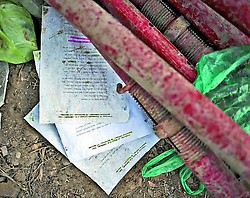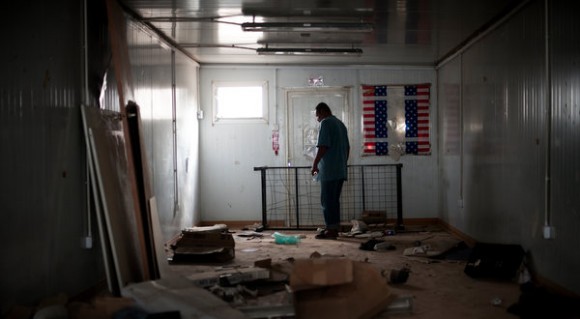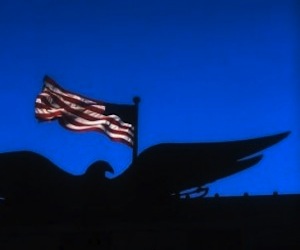US appears to shy away from talk about democracy in Middle East, despite historic anti-government rallies in ally Egypt. Obama has 'sought to equate Egypt's protesters and government as equally pitted parties in the growing conflict' [AFP]
Obama has 'sought to equate Egypt's protesters and government as equally pitted parties in the growing conflict' [AFP] AlJazzera
It's incredible, really. The president of the United States can't bring himself to talk about democracy in the Middle East. He can dance around it, use euphemisms, throw out words like "freedom" and "tolerance" and "non-violent" and especially "reform," but he can't say the one word that really matters: democracy.
How did this happen? After all, in his famous 2009 Cairo speech to the Muslim world, Obama spoke the word loudly and clearly - at least once.
"The fourth issue that I will address is democracy," he declared, before explaining that while the United States won't impose its own system, it was committed to governments that "reflect the will of the people... I do have an unyielding belief that all people yearn for certain things: the ability to speak your mind and have a say in how you are governed; confidence in the rule of law and the equal administration of justice; government that is transparent and doesn't steal from the people; the freedom to live as you choose. Those are not just American ideas, they are human rights, and that is why we will support them everywhere."
"No matter where it takes hold," the president concluded, "government of the people and by the people sets a single standard for all who hold power."
Simply rhetoric?
Of course, this was just rhetoric, however lofty, reflecting a moment when no one was rebelling against the undemocratic governments of our allies - at least not openly and in a manner that demanded international media coverage.
Now it's for real.
And "democracy" is scarcely to be heard on the lips of the president or his most senior officials.
In fact, newly released WikiLeaks cables show that from the moment it assumed power, the Obama administration specifically toned down public criticism of Mubarak. The US ambassador to Egypt advised secretary of state Hillary Clinton to avoid even the mention of former presidential candidate Ayman Nour, jailed and abused for years after running against Mubarak in part on America's encouragement.
Not surprisingly, when the protests began, Clinton declared that Egypt was "stable" and an important US ally, sending a strong signal that the US would not support the protesters if they tried to topple the regime. Indeed, Clinton has repeatedly described Mubarak as a family friend. Perhaps Ms Clinton should choose her friends more wisely.
Similarly, president Obama has refused to take a strong stand in support of the burgeoning pro-democracy movement and has been no more discriminating in his public characterisation of American support for its Egyptian "ally". Mubarak continued through yesterday to be praised as a crucial partner of the US. Most important, there has been absolutely no call for real democracy.
Rather, only "reform" has been suggested to the Egyptian government so that, in Obama's words, "people have mechanisms in order to express legitimate grievances".
"I've always said to him that making sure that they are moving forward on reform - political reform, economic reform - is absolutely critical for the long-term well-being of Egypt," advised the president, although vice-president Joe Biden has refused to refer to Mubarak as a dictator, leading one to wonder how bad a leader must be to deserve the title.
Even worse, the president and his senior aides have repeatedly sought to equate the protesters and the government as somehow equally pitted parties in the growing conflict, urging both sides to "show restraint". This equation has been repeated many times by other American officials.
This trick, tried and tested in the US discourse surrounding the Israeli-Palestinian conflict, is equally nonsensical here. These are not two movements in a contest for political power. Rather, it is a huge state, with a massive security and police apparatus that is supported by the world's major superpower to the tune of billions of dollars a year, against a largely young, disenfranchised and politically powerless population which has suffered brutally at its hands for decades.
The focus on reform is also a highly coded reference, as across the developing world when Western leaders have urged "reform" it has usually signified the liberalisation of economies to allow for greater penetration by Western corporations, control of local resources, and concentration of wealth, rather than the kind of political democratisation and redistribution of wealth that are key demands of protesters across the region.
Al Jazeera interview says it all
An Al Jazeera English interview on Thursday with US state department spokesman PJ Crowley perfectly summed up the sustainability of the Obama administration's position. In some of the most direct and unrelenting questioning of a US official I have ever witnessed, News Hour anchor Shihab al-Rattansi repeatedly pushed Crowley to own up to the hypocrisy and absurdity of the administration's position of offering mild criticism of Mubarak while continuing to ply him with billions of dollars in aid and political support.
When pressed about how the US-backed security services are beating and torturing and even killing protesters, and whether it wasn't time for the US to consider discontinuing aid, Crowley responded that "we don't see this as an either or [a minute later, he said "zero sum"] proposition. Egypt is a friend of the US, is an anchor of stability and helping us pursue peace in the Middle East".
Each part of this statement is manifestly false; the fact that in the midst of intensifying protests senior officials feel they can spin the events away from openly calling for a real democratic transition now reveals either incredible ignorance, arrogance, or both.
Yet this is precisely an either/or moment. Much as former US president Bush declared in the wake of the 9/11 attacks, we can either be "with or against" the Egyptian people. Refusing to take sides is in fact taking sides -the wrong side.
Moreover, Crowley, like his superiors, refused to use the word democracy, responding to its use by anchor al-Rattansi with the word "reform" while arguing that it was unproductive to tie events in Egypt to the protests in other countries such as Tunis or Jordan because each has its own "indigenous" forces and reasons for discontent.
That is a very convenient singularisation of the democracy movements, which ignores the large number of similarities in the demands of protests across the region, the tactics and strategies of protest, and their broader distaste and distrust of the US in view of its untrammelled support for dictatorships across the region.
Systematic silence
Ensconced in a system built upon the lack of democracy - not just abroad, but as we've seen in the last decade, increasingly in the US as well - perhaps president Obama doesn't feel he has the luxury of pushing too hard for democracy when its arrival would threaten so many policies pursued by his administration.
Instead, "stability" and "reform" are left to fill the void, even though both have little to do with democracy in an real sense.
Perhaps Obama wants to say the D-word. Maybe in his heart he hopes Mubarak just leaves and allows democracy to flourish. By all accounts, the president is no ideologue like his predecessor. He does not come from the political-economic-strategic elites as did Bush, and has no innate desire to serve or protect their interests.
Feeling trapped by a system outside his control or power to change, maybe president Obama hopes that the young people of the Arab world will lead the way, and will be satisfied by congratulations by his administration after the fact.
But even if accurate, such a scenario will likely never come to pass. With Egyptians preparing to die in the streets, standing on the sidelines is no longer an option.
A gift that won't be offered again
The most depressing and even frightening part of the tepid US response to the protests across the region is the lack of appreciation of what kind of gift the US, and West more broadly, are being handed by these movements. Their very existence is bringing unprecedented levels of hope and productive activism to a region and as such constitutes a direct rebuttal to the power and prestige of al-Qaeda.
Instead of embracing the push for real democratic change, however, surface reforms that would preserve the system intact are all that's recommended. Instead of declaring loud and clear a support for a real democracy agenda, the president speaks only of "disrupting plots and securing our cities and skies" and "tak[ing] the fight to al-Qaeda and their allies", as he declared in his State of the Union address.
Obama doesn't seem to understand that the US doesn't need to "take the fight" to al-Qaeda, or even fire a single shot, to score its greatest victory in the "war on terror". Supporting real democratisation will do more to downgrade al-Qaeda's capabilities than any number of military attacks. He had better gain this understanding quickly because in the next hours or days the Egypt's revolution will likely face its moment of truth. And right behind Egypt are Yemen, Jordan, Algeria, and who knows what other countries, all looking to free themselves of governments that the US and its European allies have uncritically supported for decades.
If president Obama has the courage to support genuine democracy, even at the expense of immediate American policy interests, he could well go down in history as one of the heroes of the Middle East's Jasmine winter. If he chooses platitudes and the status quo, the harm to America's standing in the region will likely take decades to repair.
Mark LeVine is a professor of history at UC Irvine and senior visiting researcher at the Centre for Middle Eastern Studies at Lund University in Sweden. His most recent books are Heavy Metal Islam (Random House) and Impossible Peace: Israel/Palestine Since 1989 (Zed Books).
The views expressed in this article are the author's own and do not necessarily reflect Al Jazeera's editorial policy.
 A document released by the WikiLeaks website has revealed that undercover US-led NATO forces are operating inside Syria against the Syrian government, Islam Times reported Wednesday.
A document released by the WikiLeaks website has revealed that undercover US-led NATO forces are operating inside Syria against the Syrian government, Islam Times reported Wednesday. The analyst said he learned that US-led NATO troops are already on the ground in Syria, training armed gangs.
The analyst said he learned that US-led NATO troops are already on the ground in Syria, training armed gangs. In addition, armed gangs in the country recently said they have received military hardware from France and Britain to attack government forces.
In addition, armed gangs in the country recently said they have received military hardware from France and Britain to attack government forces.








































